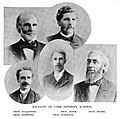| Cobb Divinity School | |
|---|---|
 Cobb Divinity School's facility from 1870 to 1895. The building now serves as John Bertram Hall on the campus of Bates College | |
| Location | |
 | |
| Coordinates | 44°06′13″N70°12′05″W / 44.103727°N 70.201483°W |
| Information | |
| Founded | March 12, 1840 |
| Closed | March 23, 1908 (merged with Bates religion department) |
Cobb Divinity School (also known as Bates Theological Seminary or the Free Will Baptist Bible School) was a Baptist theological institute. Founded in 1840, it was a Free Will Baptist graduate school affiliated with several Free Baptist institutions throughout its history. Cobb was part of Bates College in Lewiston, Maine, United States from 1870 until 1908 when it merged with the college's Religion Department.
Contents
The school created one of the first models for a Bible school in the United States. [1] The school had a close relationship with the University of Chicago with many Baptist theology students and faculty going back and forth between the schools. [2]


